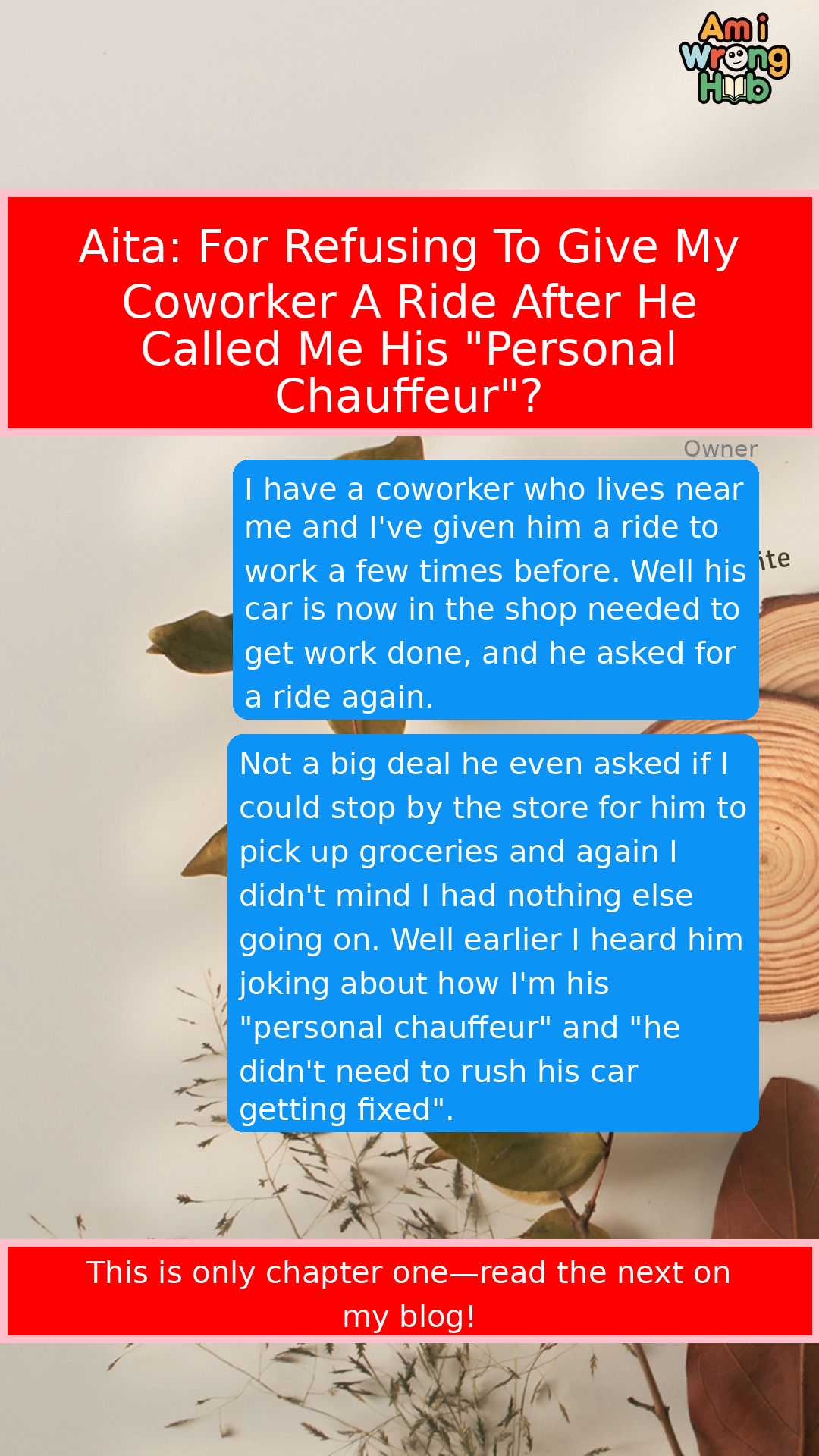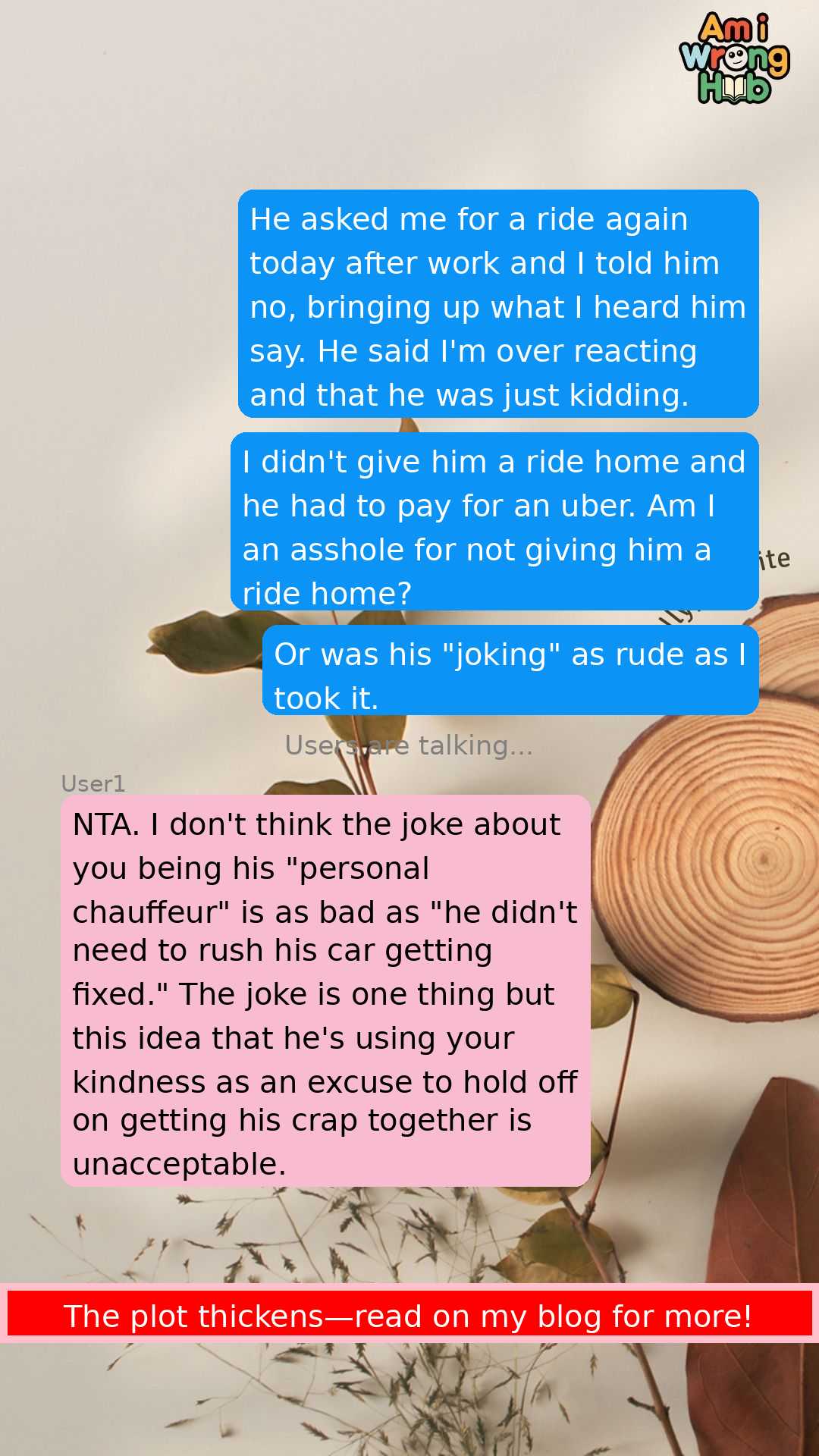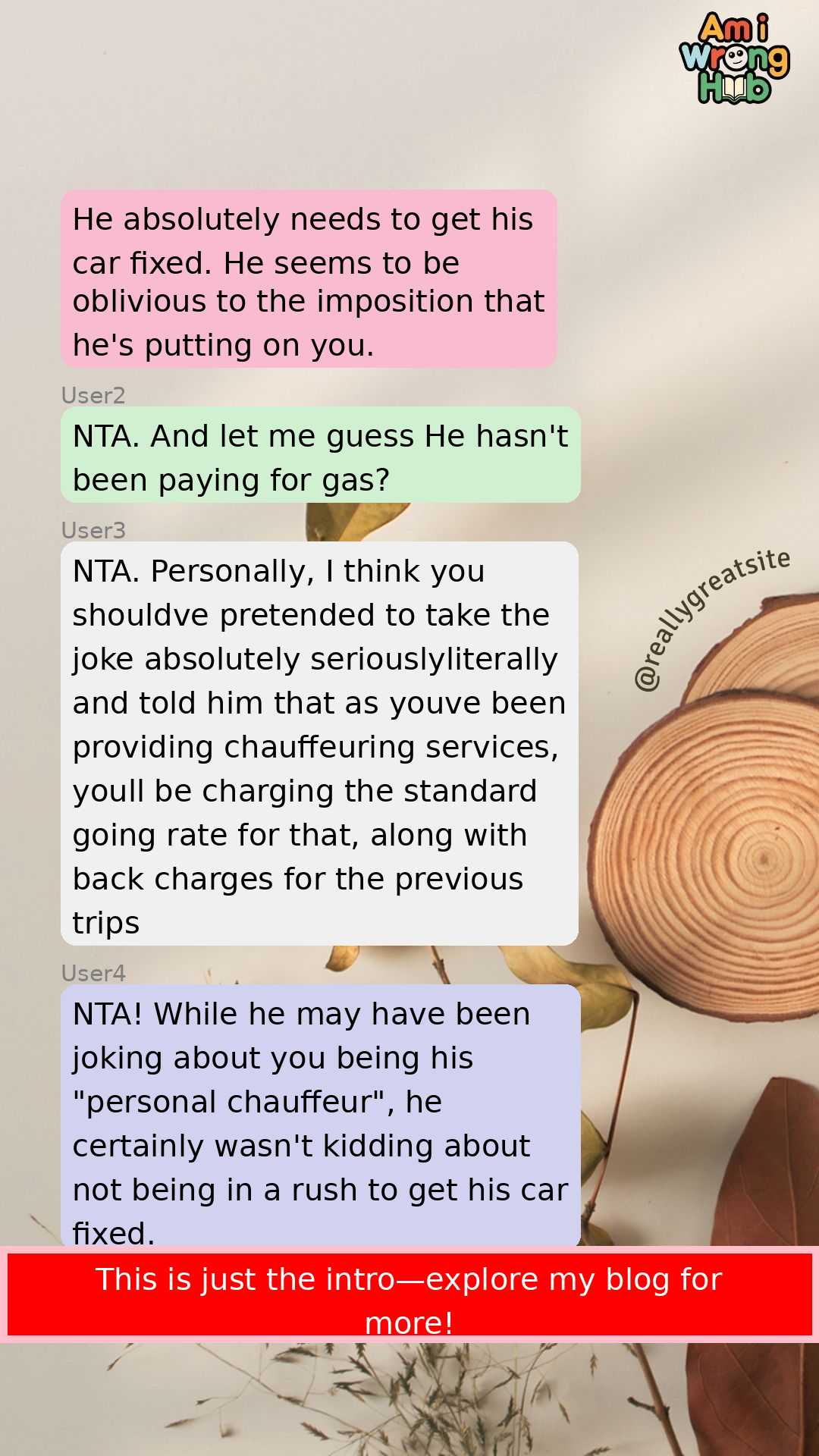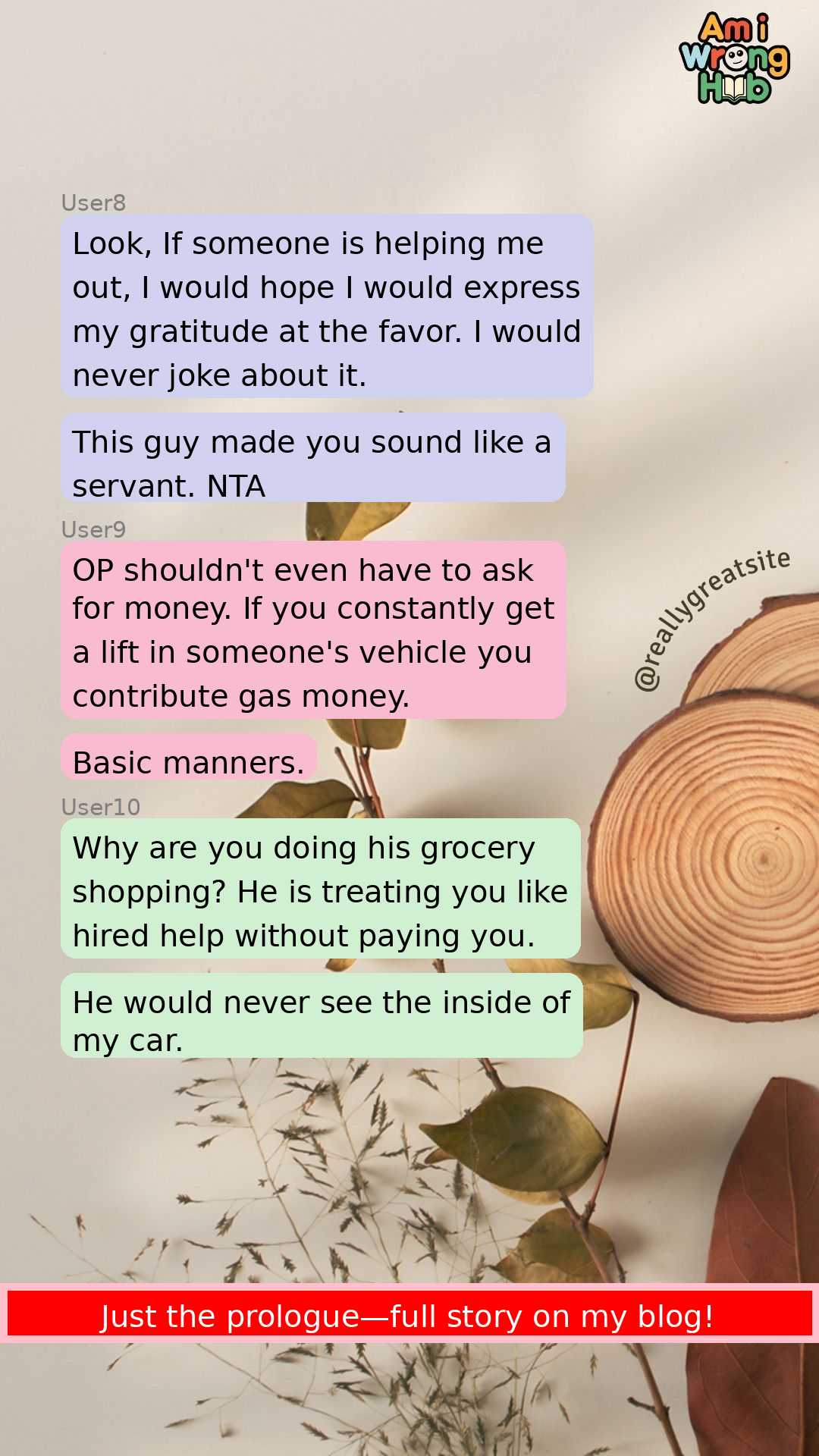AITA: for refusing to give my coworker a ride after he called me his “personal chauffeur”?
 Image credit: Pixabay (This is example image – Not the actual photo)
Image credit: Pixabay (This is example image – Not the actual photo)
When Kindness Turns into a Burden
After offering rides to a coworker whose car is in the shop, the narrator overhears him jokingly refer to them as his “personal chauffeur.” Feeling unappreciated and taken for granted, they decide to decline his request for another ride, leading to an unexpected confrontation. This relatable scenario raises questions about boundaries in friendships and the fine line between helping others and being exploited. How do you navigate kindness when it starts to feel one-sided?
Family Drama and Conflict Resolution: A Ride to Work
In a recent situation involving a coworker, a conflict arose over the dynamics of their relationship and the expectations surrounding favors. Here’s a breakdown of the events:
- Background: The narrator has a coworker who lives nearby and has previously received rides to work.
- Current Situation: The coworker’s car is in the shop for repairs, prompting him to ask for another ride.
- Additional Request: Along with the ride, the coworker requested a stop at the store to pick up groceries, which the narrator agreed to without hesitation.
- Joking Remarks: During a conversation, the coworker made light-hearted comments referring to the narrator as his “personal chauffeur,” suggesting he was not in a hurry to get his car fixed.
- Response to Jokes: Upon hearing these remarks, the narrator felt uncomfortable and decided to decline the coworker’s request for a ride after work.
- Conflict Escalation: When the narrator communicated their feelings about the jokes, the coworker dismissed them as an overreaction, insisting he was only joking.
- Outcome: The narrator did not provide the ride, leading the coworker to resort to using an Uber for transportation.
This situation highlights the complexities of interpersonal relationships in a work environment, particularly when it comes to favors and boundaries. The narrator is left questioning whether their reaction was justified or if they overreacted to what was meant as harmless humor.
- Key Considerations:
- Understanding the impact of jokes on relationships.
- Establishing personal boundaries when it comes to favors.
- Recognizing the importance of communication in resolving conflicts.
- Potential Resolutions:
- Discussing feelings openly with the coworker to clarify intentions.
- Setting clear boundaries regarding future requests for rides.
- Finding a balance between helping others and maintaining personal comfort.
In conclusion, this scenario serves as a reminder of the delicate balance between friendship and obligation, especially in a work setting. Navigating family drama and wedding tension can often lead to misunderstandings, making effective conflict resolution essential for maintaining healthy relationships.
This is Original story from Reddit
 Image credit: Pixabay (This is example image – Not the actual photo)
Image credit: Pixabay (This is example image – Not the actual photo)
Story
I have a coworker who lives near me, and I’ve given him a ride to work a few times before. Well, his car is now in the shop needing work, and he asked for a ride again. Not a big deal; he even asked if I could stop by the store for him to pick up groceries, and again I didn’t mind as I had nothing else going on.
Well, earlier I heard him joking about how I’m his “personal chauffeur” and that “he didn’t need to rush his car getting fixed.” He asked me for a ride again today after work, and I told him no, bringing up what I heard him say. He said I’m overreacting and that he was just kidding.
I didn’t give him a ride home, and he had to pay for an Uber. Am I an asshole for not giving him a ride home? Or was his “joking” as rude as I took it?
View the Original Reddit Post Here
Summary of Reddit Comments
The top Reddit comments reveal a strong consensus around NTA due to the user’s friend making inappropriate jokes about being a “personal chauffeur” and taking advantage of their kindness. Most users agree that the friend should be more considerate and contribute to transportation costs, highlighting the importance of gratitude and respect in friendships.
Overall Verdict
NTA
Expert Advice for Resolving the Conflict
Conflict in the workplace, especially among coworkers, can be challenging to navigate. Here are practical steps for both the narrator and the coworker to address the situation and foster a healthier relationship moving forward.
For the Narrator
- Reflect on Your Feelings: Take some time to understand why the coworker’s jokes made you uncomfortable. Acknowledge your feelings and validate them as important.
- Communicate Openly: Consider having a calm and honest conversation with your coworker. Express how the jokes affected you without placing blame. Use “I” statements, such as “I felt uncomfortable when you referred to me as your personal chauffeur.”
- Set Clear Boundaries: Clearly outline what you are comfortable with regarding favors in the future. For example, you might say, “I’m happy to help occasionally, but I need to maintain my own schedule.” This sets expectations moving forward.
- Be Open to Feedback: Listen to your coworker’s perspective. They may not have realized the impact of their words. Being open to their response can help rebuild trust.
For the Coworker
- Reflect on Your Humor: Consider how your jokes may have been perceived. Humor can sometimes cross boundaries, especially in a work environment. Acknowledge that what seems funny to one person may not be to another.
- Apologize Sincerely: If you recognize that your comments were inappropriate, offer a genuine apology. A simple, “I’m sorry if my jokes made you uncomfortable; that wasn’t my intention,” can go a long way.
- Show Appreciation: If your coworker has helped you in the past, express gratitude. Acknowledging their kindness can help mend any rifts and reinforce a positive relationship.
- Be Mindful of Future Requests: When asking for favors, consider how they may impact your coworker. Offering to share costs or suggesting alternative arrangements can demonstrate respect for their time and effort.
Moving Forward
Both parties should aim to foster a respectful and understanding work environment. By addressing the conflict openly and setting clear boundaries, you can work towards a more positive relationship that balances kindness with personal comfort.
Join the Discussion
 Image credit: Pixabay (This is example image – Not the actual photo)
Image credit: Pixabay (This is example image – Not the actual photo)
What do you think? Would you have handled this differently?
Share your thoughts below! Vote: Do you agree with Reddit’s verdict?




